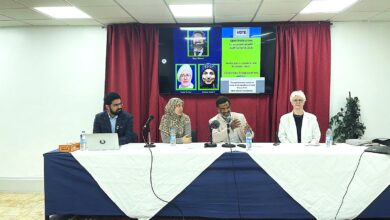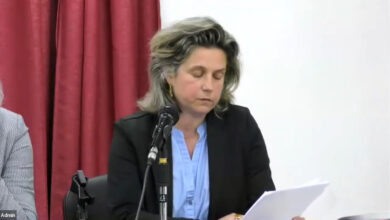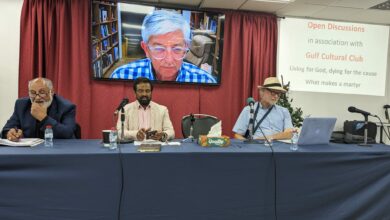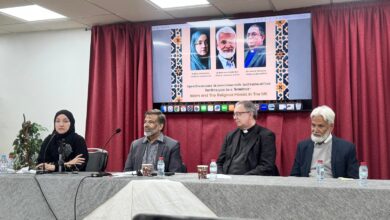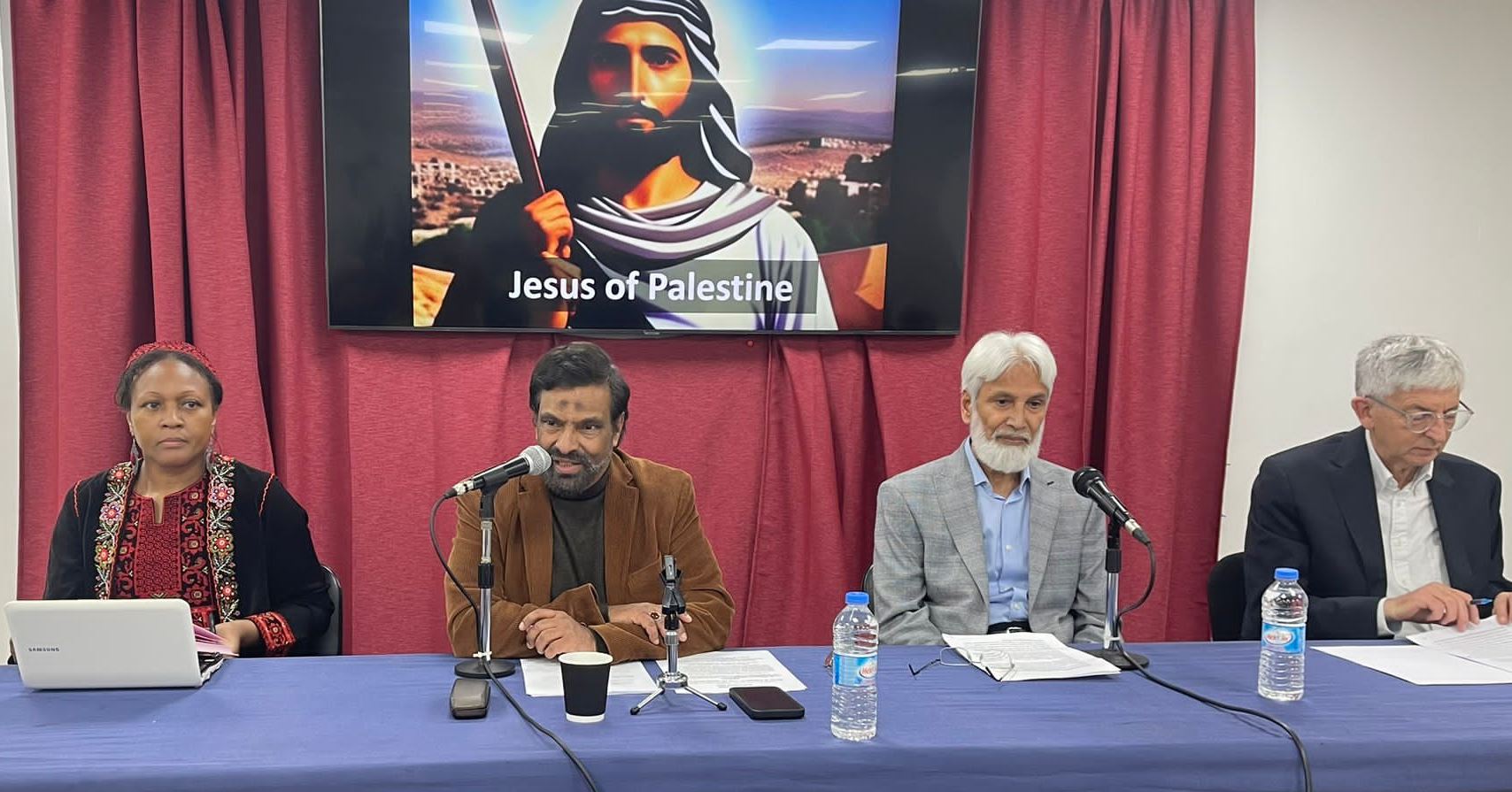
Jesus of Palestine: How he would have acted!
Open Discussions in association with Gulf Cultural Club
Tuesday 19th December 2023
Jesus of
Palestine: How he would have acted!
*Dr Mohammed Abdul Bari (former MCB Secretary General)
**Sister Catherine Tuitt MBE (Charity, humanitarian & legal
consultant)
***Dr Stephen Sizer (founder and
director of Peacemakers)
If Jesus were born today, he would be born in Gaza under the rubble.
Pastor Isaac in the Evangelical Lutheran Church in the West Bank city of Bethlehem,
the birth city of Jesus Christ.
Christmas is a special time for many. It revolves around the birth of Jesus Christ. The nativity accounts in the New Testament gospels of Matthew and Luke do not mention a date or time of year for the birth of Jesus. Karl Rahner states that the authors of the gospels generally focused on theological elements rather than historical chronologies. This year’s festive season, however, is plagued by the events in Palestine which have caused enormous human and material destruction. It is worth pondering on the ways Jesus would have reacted to those events especially that they are happening in the vicinity of his birth place. A religious approach to the crisis is thus needed. It is hoped that the seminar will contribute to the promotion of justice and peace as it marks the festive season linked to Jesus and Mary (May peace be with them).
Dr Mohammed Abdul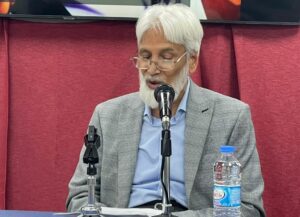 Bari: Prophets until the last prophet were chosen by God to guide humanity. Mohammed was the last prophet and Jesus was a prophet. The prophets were inspired. God created our small planet earth, he sustains it with perfect balance. That is what we have learned from Islam and from the prophets. The understanding is that the earth is a big garden for human beings and all human beings are the custodians of God on earth, to sustain this garden, the planet earth. So that is our understanding from the Quran.
Bari: Prophets until the last prophet were chosen by God to guide humanity. Mohammed was the last prophet and Jesus was a prophet. The prophets were inspired. God created our small planet earth, he sustains it with perfect balance. That is what we have learned from Islam and from the prophets. The understanding is that the earth is a big garden for human beings and all human beings are the custodians of God on earth, to sustain this garden, the planet earth. So that is our understanding from the Quran.
Now for those who may not be familiar with Islam it has six articles of faith that all Muslims must believe in. If a person does not believe in one of the articles then his or her Islam is in doubt. Jesus is seen as a prophet by Muslims.
Number one is belief in God, number two is the angles, number three is the revered holy books, number four the prophets, number five the day of judgment, number six is God’s absolute knowledge of everything from eternity. So these are the six pillars of faith.
Jesus was known for his teachings of love, compassion and justice. There was no prophet between Jesus and Mohammed. Jesus is mentioned in the Quran directly 25 times. The Muslims who have gone through the Quran realise this.
In verse 116 Chapter 5 of the Quran Jesus makes the admission to God: “You know all about me but I do not know all about yourself. “ No human being knows exactly what God is but God knows everything about us.
If Jesus was born today he would have been born under the rubble in Palestine. The Palestinian authorities have cancelled all festivities this year. It is not right that while Christmas is being celebrated all over the world the churches in the birth place of Christianity are cancelling it.
Christ would be disillusioned about how Christianity has developed in Western countries in terms of extreme materialism. We know what is happening in this country Britain. According to the census 46 percent of the people call themselves Christians. Twenty years ago it was 71 percent.
There is also the support of Christians for Israel which undermines the Palestinian cause. If Jesus had been born today he would have been born on the Palestinian side of the concrete wall built by Israel passing through Betlehem in the occupied West Bank. But Christians present a white man with blond hair.
Nobody can say with certainty what Jesus would do or not do in this age. But I think we can all agree that all decent minded human beings in the world can see that innocent civilians, especially women and children are paying with their lives for the acts of others. Seventy percent of the people who have been killed are women and children.
Sister Catherine Tuitt: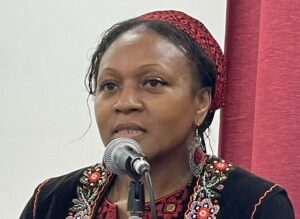 Peace be upon you all. It is difficult as my colleague said, to think of how historical figures would act in modern, contemporary times. We do have pictures from some of the bible stories of Jesus personality and how he would have reflected about what is happening today.
Peace be upon you all. It is difficult as my colleague said, to think of how historical figures would act in modern, contemporary times. We do have pictures from some of the bible stories of Jesus personality and how he would have reflected about what is happening today.
I myself have been on pilgrimage many times to Palestine and when we were asked to prepare something I decided to wear my Palestinian dress which I bought in Palestine from the women’s co-operative in Bethlehem.
So Jesus would have displayed righteous anger. Of course it would be righteous because it would be anger at the loss of human life unnecessarily. At the time when Jesus was born he was born under the rule of a Roman emperor. The emperor was Augustus and later on Ceasar and they ruled that part of the world which they had conquered and oppressed the citizens. And that is what we are seeing today.
And Jesus ministry was as we have heard from my colleagues a ministry of peace and he preached non violence. Jesus was full of compassion which you can see in many of the books of the teachings of Matthew, Luke and John. And he had compassion for women and for the children so Jesus would have been righteously angry at the killing of tens of thousands of women and children and men in Palestine.
In modern day terms Jesus was quite revolutionary. Not only was he an advocate of women and children. He loved his mother and took up many such causes in fighting for the poor and those who were oppressed by the Romans and those who were appointed by the Romans.
Jesus was born in Nazareth. We can find some insights into Jesus personality in some passages of the bible. It described that Jesus turned over some tables in the temple of the money changers. When the Passover was at hand and he went into Jerusalem into the temple and found oxen and sheep and the tables of the money changers and he threw them out of the temple and over turned all their tables.
And he said to them take these things away. Do not make my father’s house a house of merchandise. And he was quite angry. Jesus had a bit of a temper but it was righteous anger. And today you see that Christmas is becoming commercialised and the traditional message of Christmas is that Jesus said do not make my father’s house a house of merchandise. It is right that Christmas is being cancelled in the holy land in Bethlehem. How can we celebrate the birth when so many of our brothers and children are being killed and innocent lives lost?
As I said in Jesus time the Holy Land was still part of the Roman empire. Roman laws and customs were imposed. And many like Jesus did not like the Romans and people wanted to rise up and get rid of the oppressive Romans who had invaded and occupied Palestine.
Pontius Pilot was also appointed by the Romans and he oversaw the execution of Jesus. Jesus had gathered many followers due to his teachings and his ministry. And many Palestinian Jews wanted to overthrow the Romans. And today we see many Israelis marching from their homes to Jerusalem to the house of their elected leaders calling on them to resign.
They have actually had five elections in three years in Israel. There have been corruption and criminal charges against their prime minister. Still they have not yet managed to overthrow him. Some said that Jesus was a terrorist fighting against the Roman oppression. I wouldn’t go as far as that but definitely his teachings may have agitated some. That is the path of human resistance.
Dynasties like the Herrod dynasty were oppressing Jesus and his followers. And where the chief priests said we have no king but Ceaser they said that because they were scared of the Roman leaders. If you look at Matthew chapter 21, verse 13 Jesus said: “Unto them it is written my house shall be called a house of prayer and you have made it a den of thieves.”
In verse 45 of John when the chief priests and Pharisees had heard Jesus parables they could see that he had spoken about them as being part of the den of thieves. But when they tried to lay hands on him they feared the multitude of his followers because Jesus was seen as a prophet.
So we have seen Jesus preach non violence and in his sermon on the month which we find in Matthew 5,6, and 7 is one of the most detailed teachings of Jesus Christ recorded in the New Testament. In this vital teaching Jesus Christ sets out the essential facets of the way of life that he taught to his followers.
One of the central themes of the sermon on the mount is Christ ’s expectation of his followers to be characterised by peace and not by violence or war. In the opening of this great sermon, known as the beatitudes, Jesus taught blessed, happy are the peace makers for they shall be called the sons of God.
In Matthew Chapter 5 verse 9 Christ’s followers should be characterised by living in a way that leads to peace. Now this is totally opposite to the characteristics of the life which we see now in Palestine. Today it is characterised by violence and hatred.
The Christian standard of being a peace maker is found throughout the New Testament and the Apostle Paul wrote that Christians should, where ever it is possible, live peacefully with all men and women.
And in Romans Chapter 12 verse 18 we see that Christians are meant to pursue peace with all people. We see again in Hebrews Chapter 12 verse 14 and also in the second book of Corinthians Chapter 12 verse 11 and Galatians Chapter 5 verse 22 and James Chapter 3 verse 17 that the spirit of the sixth commandment shows that inner anger and hostility towards other human beings also breaks the law.
Jesus also made a shocking statement in commenting on the sixth commandment : “But I say to you that everyone who is angry with his brother will be liable to judgment; whoever insults his brother will be liable to the council; and whoever says, ‘You fool!’ will be liable to the hell of fire. But I say, if you are even angry with someone, you are subject to judgment!Mathew chapter 5 verses 22 – 22.
So Jesus was expanding the scope of the sixth commandment by revealing the spirit of the law. Jesus showed that it is not just the physical act of murder that breaks the sixth commandment but inner anger and hostility towards other human beings as well. So even having feelings of hatred towards other human beings is a sin and breaks the sixth commandment.
“The rest of the bible of course elaborates on these statements. John wrote: “Whoever hates his brother is a murderer and you know that no murderer has life eternal.” (Chapter 3 verse 15). And there are many other scriptures I could refer you to this evening.
But the ultimate intent of this command is to help us to understand that God wants us to show love towards other human beings. Now Christ’s approach in contemporary life would be to be angry righteously but he would still be pursing peace. Jesus said you shall love your neighbour but he also said love your enemies. “Be good to those who hate you and pray for those who spitefully hurt you and persecute you.” You will find that in Matthew Chapter 5 verses 38, 39, 43,44.
These verses could be considered some of the hardest of Jesus teachings to ever apply. And the gospel account shows that Jesus not only taught this standard of peace but he practised it. In Mathew we can see that Jesus said love do not harm your neighbour therefore love is a fulfilment of the law.
God’s law is consistent and God promised to fight our battles and the hardness of our hearts. Jesus would want his followers to continue to put their trust in him for protection and be noted for our peace and love for others. Jesus would be righteously angry about the situation today in Palestine, the destruction of churches and many mosques. But Jesus teachings have been proven and stood the test of time and only peace and non violence through diplomacy and political resolutions is what I think Jesus would be fighting for. An end to human conflicts and the conflict in Palestinen and for a Palestinian state.
Stephen Sizer: The Evangelical Lutheran Christmas Church in Bethlehem are commemorating the birth of Jesus Christ differently this year. They have created a nativity scene resembling the situation in Gaza amid Israel’s brutal onslaught. The nativity scene shows a baby wrapped in the traditional Palestinian keffiyeh and placed in debris and rubble. While the keffiyeh symbolises Palestinian identity, history, and struggle, the debris represents destruction in Gaza, where at least 20,000 people have already been killed by Israel’s indiscriminate war, and thousands more are missing under the rubble, most of them children and women.
Evangelical Lutheran Christmas Church in Bethlehem are commemorating the birth of Jesus Christ differently this year. They have created a nativity scene resembling the situation in Gaza amid Israel’s brutal onslaught. The nativity scene shows a baby wrapped in the traditional Palestinian keffiyeh and placed in debris and rubble. While the keffiyeh symbolises Palestinian identity, history, and struggle, the debris represents destruction in Gaza, where at least 20,000 people have already been killed by Israel’s indiscriminate war, and thousands more are missing under the rubble, most of them children and women.
The baby Jesus represents the thousands of children buried beneath the rubble in Gaza. The vicar of the Nativity Church, the Revd Dr Munther Isaac, said: “If Jesus were born today, he would be born in Gaza under the rubble.” The municipalities and churches in Bethlehem and Ramallah have announced that Christmas celebrations have been cancelled in the occupied West Bank in solidarity with Gaza, calling on parishes instead to collect donations to help the victims.[1]
As we reflect on Christmas at the Gulf Cultural Club, we have been asked to consider two questions this evening. First, how would Jesus deal with the current situation in Palestine? Second, how can peace be promoted today? The hope is that this seminar will contribute to the promotion of justice and peace as we mark the festive season linked to Jesus and Mary. Let’s consider these two questions one at a time.
How Would Jesus Deal with the Current Situation in Palestine?
In Christian circles there is a popular expression ‘What Would Jesus Do?” You can find wrist bands with four letters “WWJD”. But tonight we don’t need to speculate on how Jesus might act because we know from the gospels how Jesus confronted those in power in his day – whether the brutal Roman military colonisers of Palestine, the Jewish religious and political leadership who collaborated with the Romans or the Jewish zealots who resisted the occupation violently. So we don’t need to speculate about WWJD – what would Jesus do? Because we know WJDD – What Jesus did do? We can actually begin with what is known as the Song of Mary which she sang when told she would give birth to Jesus the Saviour.
The Song of Mary
“My soul glorifies the Lord
and my spirit rejoices in God my Saviour…
His mercy extends to those who fear him,
from generation to generation.
He has performed mighty deeds with his arm;
he has scattered those who are proud in their inmost thoughts.
He has brought down rulers from their thrones
but has lifted up the humble. He has filled the hungry with good things
but has sent the rich away empty.”
(Luke 1:46-47, 50-53)
Mary’s prophetic words predict the work of Jesus “He has brought down rulers from their thrones but has lifted up the humble. He has filled the hungry with good things but has sent the rich away empty.” Dietrich Bonhoeffer, the German pastor who challenged the Nazis and who was executed just before the end of the Second World War, wrote in 1933:
“The song of Mary is at once the most passionate, the wildest, one might even say the most revolutionary advent hymn ever sung. This is not the gentle, tender, dreamy Mary whom we sometimes see in paintings… This song has none of the sweet, nostalgic, or even playful tones of some of our Christmas carols. It is instead a hard, strong, inexorable song about the power of God and the powerlessness of humankind.” ~ Dietrich Bonhoeffer (Advent, 1933)
The Song of Mary resonates with Palestinians today also. While we urge the International Court of Justice to investigate and bring to trial Israeli war criminals, the song insists the arc of history ultimately bends toward the justice of God which will be swift and final. Justice is coming for all who are oppressed. They will be vindicated. The Song of Mary.
The Wrath of Herod
In Matthew’s Gospel we learn what happened shortly after the birth of Jesus. Magi from Iran appeared following a star and searching for the one to be born King of the Jews. Matthew’s gospel tells us that King Herod was greatly disturbed and all Jerusalem. That is code for those in power who were collaborating with the Roman occupiers. This is how Herod dealt with this threat to his power.
“When Herod realized that he had been outwitted by the Magi, he was furious, and he gave orders to kill all the boys in Bethlehem and its vicinity who were two years old and under, in accordance with the time he had learned from the Magi.” (Matthew 2:13-16)
Jesus and his parents escaped and sought asylum in Egypt while Herod ordered the murder of every male child in Bethlehem. This speaks into what is happening in Gaza. Where did the people in Gaza come from? Gaza is a constant reminder to the Israelis that they stole the land of Palestinians to create their settler colonial apartheid state. The murder of thousands of children in Gaza is nothing less than genocide and ethnic cleansing. Israel is attempting to erase Palestine. And there is a very real threat that the Israelis will force the people of Gaza into the Egyptian desert just like Mary and Joseph and their baby son. The Song of Mary. The Wrath of Herod.
The Jubilee of Jesus
In Luke 4 we read the first and probably most controversial sermon of Jesus. At just eight words, it was his shortest sermon, and, if the crowds had had their way, it would have been his last.
The text was from the prophet Isaiah.
“The Spirit of the Lord is on me,
because he has anointed me
to proclaim good news to the poor.
He has sent me to proclaim freedom for the prisoners
and recovery of sight for the blind,
to set the oppressed free,
19 to proclaim the year of the Lord’s favour.”
20 Then he rolled up the scroll, gave it back to the attendant and sat down. The eyes of everyone in the synagogue were fastened on him. 21 He began by saying to them, “Today this scripture is fulfilled in your hearing.” (Luke 4:18-21; Isaiah 61:1-2)
The prophet Isaiah is referring to the coming of the Messiah to announce the Year of Jubilee (which occurred every 50 years). All debts were annulled, all slaves were freed and any property sold or loaned was returned to each family. It was intended to avoid extremes of wealth and poverty among God’s people, and ensure justice, liberty, and equality. Jesus insists the Jubilee had come because the Sovereign King had now arrived. Proclaiming freedom for prisoners, setting the oppressed free and proclaiming the year of jubilee was a direct threat to those in power with vested interests, who were wealthy by charging interest on loans, exploiting the poor or collaborating with the Roman Empire. And when Jesus insisted God’s blessing of liberty was not exclusively for the Jewish people but also for the Gentile nations, the crowd reacted just as Zionist supremacists do today.
“All the people in the synagogue were furious when they heard this. 29 They got up, drove him out of the town, and took him to the brow of the hill on which the town was built, in order to throw him off the cliff. 30 But he walked right through the crowd and went on his way.” (Luke 4:28-30)
It is therefore not surprising that the small Christian community in Gaza has been the target of attacks on their churches, schools and hospitals. Just as in the West Bank, the presence of an indigenous Palestinian Christian community calling for liberation from oppression challenges the racist agenda of Western Christian Zionists who endorse and defend Jewish Zionists. Israel wants to portray this as a conflict between Jews and Muslims to ensure Christians side with them. Palestinian Christians repudiate this supremacism and racism and so they are targeted.
The Song of Mary. The Wrath of Herod. The Jubilee of Jesus.
The Anger of Jesus
There are several instances in the Gospels where Jesus displays anger and confronts those in power, especially religious leaders who used their positions to exploit the poor and in particular, foreigners. We see this very clearly when Jesus cast out the money changers and traders from the Temple.
“Jesus entered the temple courts and drove out all who were buying and selling there. He overturned the tables of the money changers and the benches of those selling doves. 13 “It is written,” he said to them, “‘My house will be called a house of prayer, but you are making it ‘a den of robbers.’” (Matthew 21:11-12)
The temple was intended to be the place where people of all nations could meet with God. But to enter, pilgrims had a pay a temple tax using a special coin minted in Tyre because of its high silver content. Since the priests of the temple in Jerusalem accepted the temple tax only in this currency, money changers around the Temple offered their services, converting foreign money to this coin type at exorbitant exchange rates. But add to that, the priests would determine whether the animal sacrifices brought were without blemish. Invariably the animals would be deemed impure and so pilgrims were forced to purchase an animal provided by the temple traders. So they were fleeced twice. No wonder Jesus condemns this exploitation. Jesus made a whip and drove out the money changes and animal traders from the Temple. If this is how Jesus reacted, we do not have to speculate about how Jesus will respond to those who bomb places of worship and murder refugees sheltering in them.
The Song of Mary. The Wrath of Herod. The Jubilee of Jesus. The Anger of Jesus.
The Authority of Jesus
“Later they sent some of the Pharisees and Herodians to Jesus to catch him in his words. They came to him and said, “Teacher, we know that you are a man of integrity. You aren’t swayed by others, because you pay no attention to who they are; but you teach the way of God in accordance with the truth. Is it right to pay the imperial tax to Caesar or not? Should we pay or shouldn’t we?” But Jesus knew their hypocrisy. “Why are you trying to trap me?” he asked. “Bring me a denarius and let me look at it.” They brought the coin, and he asked them, “Whose image is this? And whose inscription?” “Caesar’s,” they replied. Then Jesus said to them, “Give back to Caesar what is Caesar’s and to God what is God’s.” And they were amazed at him.” (Mark 12:13-17)
The Romans taxation was immensely unpopular. Some Jews refused to pay because it implied that the idolatrous emperor was king, not God. So the religious leaders tried to trap Jesus. Should they pay the tax or not? If he refused they could report him to the Romans. If he agreed, they could accuse him of collaboration. Instead, Jesus turns the tables on them. On one side of the denarius coin was an imager of Caesar, and on the other side, an inscription “Son of divine Augustus.” Jesus rejects the either, or choice and insists we must pay our taxes but our true loyalty is to the God in whose image we are created. God is sovereign and we must serve him, and him alone. All earthly rulers, including the most powerful Caesars today – like the US President and the Israeli Prime Minister are accountable to him as we are.
The Song of Mary. The Wrath of Herod. The Jubilee of Jesus. The Anger of Jesus. The Authority of Jesus.
The Judgement of Jesus
Often portrayals of Jesus, whether in hymns or in art, are of someone who is gentle, meek, nice, domesticated, but in the Gospels we encounter a Jesus who is militant, unleashed, untamed, unpredictable. This is especially true as he spoke truth to power and exposed the hypocrisy and corruption of those in authority. Just before his arrest Jesus gave a speech which included these words:
“Woe to you, teachers of the law and Pharisees, you hypocrites! You shut the door of the kingdom of heaven in people’s faces. You yourselves do not enter, nor will you let those enter who are trying to…
“Woe to you, teachers of the law and Pharisees, you hypocrites! You are like whitewashed tombs, which look beautiful on the outside but on the inside are full of the bones of the dead and everything unclean. 28 In the same way, on the outside you appear to people as righteous but on the inside you are full of hypocrisy and wickedness…
“You snakes! You brood of vipers! How will you escape being condemned to hell? 34 Therefore I am sending you prophets and sages and teachers. Some of them you will kill and crucify; others you will flog in your synagogues and pursue from town to town.35 And so upon you will come all the righteous blood that has been shed on earth, from the blood of righteous Abel to the blood of Zechariah son of Berekiah, whom you murdered between the temple and the altar. 36 Truly I tell you, all this will come on this generation.” (Matthew 23:13-36)
Jesus called the religious leaders snakes and vipers. Jesus used strong language to condemn those who claimed to serve God but who only served themselves. He exposed and shamed them in public. I mentioned earlier the first sermon of Jesus in which he quoted the prophet Isaiah about the jubilee.
While we urge the UN to impose sanctions on Israel and lobby the International Court of Justice to investigate Israeli war crimes, we know the US will continue to use its veto to shield Israel and so justice may take a long time and at best may only be partial.
Which is why my hope is in what Jesus did not quote from Isaiah 61. Jesus did not quote the whole sentence. He stopped halfway. What did he leave out? “To proclaim the year of the Lord’s favour… and the day of vengeance of our God.” (Isaiah 61:2). Why did Jesus not finish the sentence? Why did he leave out “and the day of vengeance of our God”? Because in his first coming, Jesus came to save. But Jesus promises he will return one day soon to judge. That is why we are told,
“Do not take revenge, my dear friends, but leave room for God’s wrath, for it is written: “It is mine to avenge; I will repay,” says the Lord.” (Romans 12:19)
The Song of Mary. The Wrath of Herod. The Jubilee of Jesus. The Anger of Jesus. And the Judgement of Jesus.
Based on the gospels, Jesus therefore has something to say to the US and European settler colonialists imposing apartheid on Palestine, something to say to those within the Palestinian leadership who collaborate with the occupation forces as well as to those who resist the occupation violently.
The second question we have been asked to consider is “How can peace be promoted today?”
How can peace be promoted today?
Once again, rather than speculate, we can turn to the teaching of Jesus and consider how he expected of his disciples, his followers to respond to injustice and violence. In what is known as the Sermon on the Mount Jesus gives us at least three specific instructions.
Become a Peacemaker
“Blessed are the peacemakers, for they will be called children of God. Blessed are those who are persecuted because of righteousness, for theirs is the kingdom of heaven.“ Blessed are you when people insult you, persecute you and falsely say all kinds of evil against you because of me. Rejoice and be glad, because great is your reward in heaven, for in the same way they persecuted the prophets who were before you. (Matthew 5:9-12)
Jesus pronounced a blessing on peacemakers and described them as children of God. Why? Because God is the God of peace. His children are therefore identified by their actions as peacemakers. Not widow makers. And not even peacekeepers but peacemakers. Peacemakers bring peace when there is an absence of peace. Peacemaking is proactive, it takes the initiative. And notice Jesus promises certain consequences. Peacemakers will be insulted, peacemakers will be persecuted – will have false accusations made against them – they will be accused of antisemitism or of supporting terrorism. Notice Jesus says ‘when’, not ‘if’, this happens, but when persecution comes remember… to rejoice! Jesus says, ‘rejoice… rejoice and be glad’ because great is your reward in heaven. Peacemaking is not for the fainthearted. But how do we become peacemakers? A second instruction from Jesus:
Love Your Enemies
“You have heard that it was said, ‘Love your neighbor[i] and hate your enemy.’ But I tell you, love your enemies and pray for those who persecute you, that you may be children of your Father in heaven.” (Matthew 5:44-45)
This is one of the hardest commands Jesus ever gave. But again notice what loving our enemies reveals. That we are God’s children. Because Jesus loved his enemies, because Jesus forgave his enemies, even as they crucified him, we must too. Rather than kill our enemies we are to win our enemies. How? How do you love someone? Anyone? By seeking their welfare, their best interests, by meeting their needs. If you see someone going the wrong way down a one-way street what do you do? You warn them because you want to avoid an accident. How do we seek the welfare of our enemies? By praying for them . By asking God how we can best help turn them from enemies to friends. One way is through BDS – Boycotts, Divestment and Sanctions. These are non-violent ways to help to bring about change. And they work – we have seen success against Ahava, G4S, Caterpillar, Veolia, Puma, BDS works. Become a peacemaker, love our enemies and,
Turn the Other Cheek
“You have heard that it was said, ‘Eye for eye, and tooth for tooth’. But I tell you, do not resist an evil person. If anyone slaps you on the right cheek, turn to them the other cheek also.” (Matthew 5:38-39)
Jesus is prohibiting retaliation, not resistance. This is clear from the illustration he uses. A slap on the right cheek would be from a backhanded cuff, a common Jewish insult by a superior to a subordinate, not an aggressor’s blow. How do we usually respond to aggression? In one of two ways, fight or flight. Retreat or retaliation. Jesus commands neither. If someone has slapped you on the cheek and you offer them the other cheek, where are you standing? You have not moved. You have stood your ground. You are challenging your opponent to realise what they have done and step back from the confrontation. Turning the other cheek is an act of defiance. We need more acts of defiance – like flying the Palestinian flag, like using the slogan ‘from the river to the sea’ because we are not calling for another genocide but liberation. Martin Luther King once said,
“Nonviolence is a powerful and just weapon. It is a weapon unique in history, which cuts without wounding … It is a sword that heals.” (Martin Luther King Jr)
We have considered two important questions this evening. First, how would Jesus deal with the current situation in Palestine? Second, how can peace be promoted today?
Let me summarise what we have discovered by quoting from Theo Horesh’s book, The Holocausts We All Deny[2],
“If you are going to celebrate Christmas this year, consider emphasizing Jesus’ resistance to the occupation of Palestine. Jesus lived and died in occupied Palestine and was crucified at the hands of the occupying Romans. His mission was, in many ways, a response to the suffering engendered through occupation…
“Jews at the time of Christ struggled to formulate an effective response to the Roman occupation. The Zealots fought it in much the same manner as Hamas. The Essenes sought to escape it, and the Pharisees collaborated in the interest of religious self-preservation, in a roughly comparable manner to the Palestinian Authority. Jesus was different: he did not resist the Roman occupation of Palestine but rather undermined it. He undermined the occupation by placing God above the occupying power and by using love to abolish the distinction between occupier and occupied. He undermined it by challenging religious authorities that were accommodating the occupation and by presenting an alternative vision so compelling it would eventually win over the occupiers…
Jesus tapped into a more powerful narrative of the human story, along with a more powerful set of emotions than those commonly associated with resistance… It was a narrative capable of winning over its enemies while simultaneously enlarging the hearts and identities of its followers. It transformed collective suffering by demonstrating its transformational potential, and it overcame collective trauma by rooting it in an overarching religious story explaining its meaning.
Jesus also crafted a vision that was able to transform the world, which is especially important in redressing an occupation and a conflict that has done so much to tear it apart.
Jesus represents a sort of middle way between violent resistance, passive acquiescence, and collaboration. There is no one-state or two-state solution in the teachings of Jesus… He challenges worldly powers without giving worldly solutions. He fights Roman rule through the example of his humility… sacrificing himself in an epic confrontation with occupying power and occupied collaborators alike—and ultimately winning over the occupiers.”
May the sacrifice of the people of Gaza bring an end to Zionist apartheid and bring liberty, justice and peace to Palestine.
Howard Thurman was an influential African American author, theologian, and civil rights leader. In 1944, Thurman co-founded San Francisco’s Church for the Fellowship of All Peoples, the first integrated, interfaith religious congregation in the United States. He also wrote two very powerful poems about Christmas which help answer our questions tonight. With them I will close:
Christmas Is Waiting to be Born
“Where refugees seek deliverance that never comes
And the heart consumes itself as if it would live,
Where children age before their time
And life wears down the edges of the mind,
Where the old man sits with mind grown cold,
While bones and sinew, blood and cell, go slowly down to death,
Where fear companions each day’s life,
And Perfect Love seems long delayed.
Christmas is waiting to be born:
In you, in me, in all mankind.”
The Work of Christmas
“When the song of the angels is stilled,
When the star in the sky is gone,
When the kings and princes are home,
When the shepherds are back with their flock,
The work of Christmas begins:
To find the lost,
To heal the broken,
To feed the hungry,
To release the prisoner,
To rebuild the nations,
To bring peace among people,
To make music in the heart”[3]
[1] https://www.newarab.com/news/bethlehem-church-nativity-scene-symbolises-gaza-genocide
[2] https://www.amazon.co.uk/Holocausts-We-All-Deny-Collective/dp/1936955210
[3] The Mood of Christmas and Other Celebrations https://www.amazon.co.uk/Mood-Christmas-Other-Celebrations/dp/0913408905/
*Muhammad Abdul Bari is an educationalist, civic activist and parenting consultant who has authored several books, including his own memoirs. He started his career as a Bangladesh Air Force officer in the late 1970s. After completing his PhD in Physics from King’s College London in 1986 he worked in the education sector including as a Behavioural Specialist teacher. He has had involvement with several large voluntary organisations e.g., being a board member of the London Organising Committee of the Olympic & Paralympic Games (London 2012) and secretary general of the Muslim Council of Britain (2006-10). He is an Hon Fellow of the QMUL and holds a Hon Doctorate of Education from the UEL.
**Catherine Tuitt, MBE is Change Agent, Charity, humanitarian and legal consultant in London. She grew up in an immigrant family headed up by her widowed mother. She attended a London church primary, and secondary state school. After college she earned a law degree at university. She pursued further academic studies in forensic science, anatomy pathology and physiology. She served as a Labour Councilor in East London and public service at the Home Office in Westminster. She is a freelance law advisor. Her second career was in the NHS. Catherine is a passionate creative person who loves painting, artwork, photography and writing books. She is advocate for anti-knife crime, and ending violence against women and girls. She is passionate about restorative justice, that is supported by victims and for peace, both in the UK and around our world. She is fondly known as Shanti or Aqua.
***The Revd Dr Stephen Sizer is the founder and director of Peacemakers, a charity which seek to be catalysts for peace making, especially where minorities are persecuted, where justice is denied, human rights are suppressed or reconciliation is needed. Stephen is chair of the Convivencia Alliance and an executive member of the Israeli Committee Against House demolitions (ICAHD). Stephen is a retired Anglican priest. His PhD was a ground-breaking critique of Christian Zionism. He is the author of two books on Christian Zionism.
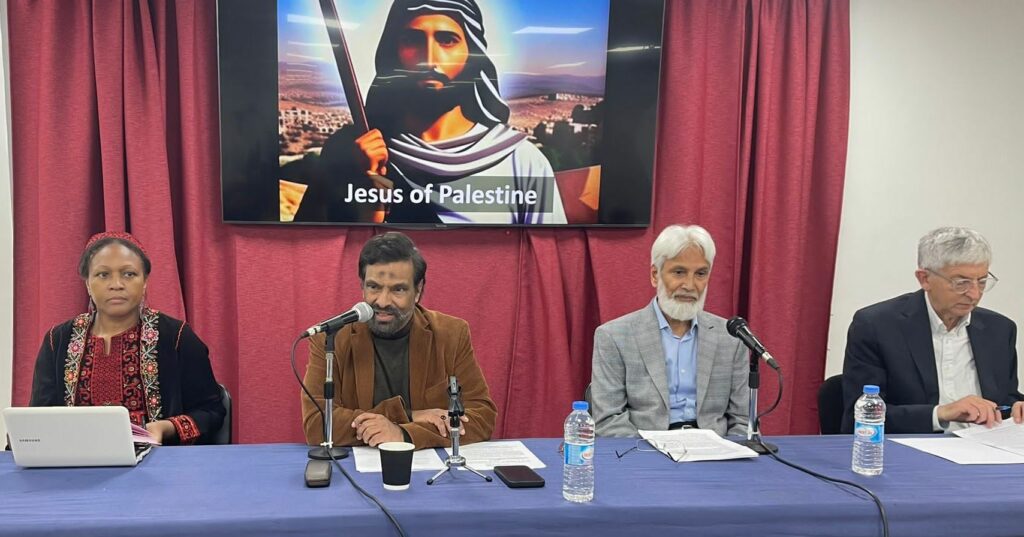
Lorem ipsum dolor sit amet, consectetur adipiscing elit. Ut elit tellus, luctus nec ullamcorper mattis, pulvinar dapibus leo.

